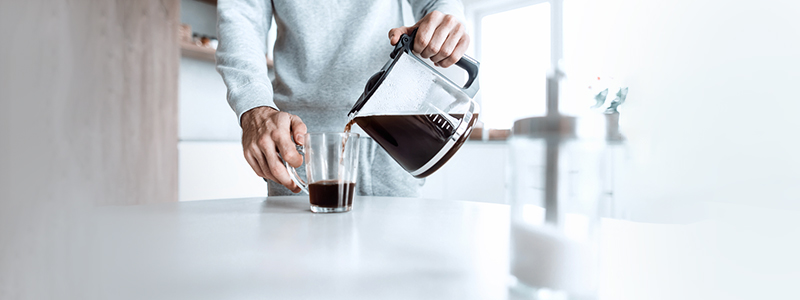
Lasting Impact of Coffee, Smoking, & Alcohol on Blood Pressure

Table of Contents
Hectic routines, sedentary lifestyle, stressful work schedules, unhealthy diets, bad habits and increased pressures in life have made lifestyle conditions like type 2 diabetes and high blood pressure (hypertension) prevalent in young adults and millennials. In addition, many young adults also indulge in habits like coffee drinking, smoking and consumption of alcohol– all of which can have a lasting impact on blood pressure levels and overall health and wellbeing!
Here’s How Alcohol, Coffee, and Smoking Cause Blood Pressure
Drinking in moderate amounts and sipping on your favourite brewed coffee is permissible. However, excessive alcohol and coffee, and smoking significantly impact cardiovascular health. So, if you ever wondered – ‘Does alcohol increase blood pressure?” or how does smoking increase blood pressure?” here’s what you need to know!
1. Impact of Alcohol
Did you know excessive alcohol consumption can increase your blood pressure levels? While one drink a day is acceptable, having more than three drinks can increase your blood pressure temporarily. However, consuming more than three drinks every day can cause a long-term increase in your blood pressure levels and put you at a greater risk of developing cardiac ailments like heart attack, stroke and cardiac failure.
If you have a family history of hypertension or have shown a tendency of high blood pressure lately, you must cut back on your alcohol consumption or avoid it altogether. Excessive drinking is defined as consuming more than four drinks in two hours for women and five or more drinks for men. Moderate drinking involves up to one drink for women and two for men. If you drink over three or four glasses (in men and women, respectively), you probably drink excessively.
While alcohol raises your blood pressure, its high-calorie content can also result in obesity, type 2 diabetes and cardiovascular diseases. Also, it is essential to note that alcohol can interact with medications, including many antihypertensives.
2. Impact of Smoking
Smoking and drinking are two risk factors for cardiovascular diseases, including high blood pressure. Smoking is a leading cause of premature death worldwide. Though smoking has been proven to cause heart attack, stroke and even cancer, its link to high blood pressure is still unclear. Studies state that exposure to first hand and second-hand smoke can both increase your risk for fatty substances or plaque build-up in blood vessels, contributing to a rise in blood pressure levels. This effect is brought about by nicotine found in cigarettes and tobacco smoke. So, every time you smoke, you are essentially contributing to the narrowing down of your blood vessels and a subsequent increase in blood pressure. The narrowing of blood vessels increases the resistance in the blood vessels, raising the stress on the heart.
3. Impact of Coffee
Coffee contains caffeine and drinking it causes a short but evident rise in blood pressure levels in everyone, even if you are not hypertensive. The exact cause of why caffeine causes an increase in blood pressure is unknown, and the effect that caffeine has also differs for everyone. Some studies state that caffeine blocks the effect of a hormone responsible for widening arteries and, therefore, causes a rise in blood pressure. Few studies blame the increase in blood pressure on adrenaline, which they believe is released by the adrenal glands on drinking caffeine.
Since caffeine affects everyone differently, one who drinks caffeinated drinks regularly has a higher than normal average blood pressure. However, another group of people tends to develop a tolerance to the substance because caffeine no longer affects their blood pressure levels.
Though not directly blamed for the rise in blood pressure, the US FDA recommends consuming 400 mg of caffeine a day. If you are hypertensive, you must limit your caffeine intake or find a safer alternative. It may be a good idea to consume caffeine less than 200 mg per day to keep your blood pressure levels within limits. It is also advisable to avoid drinking caffeinated drinks before activities like exercising, weight lifting or physical labour that cause a rise in blood pressure levels.
If you suspect coffee to be the cause of your rising blood pressure, check your blood pressure levels before and after drinking coffee. So, the answer to ‘does caffeine increase blood pressure?’ is ‘yes.’
Conclusion
Coffee, alcohol, and smoking are everyday habits among young adults. However, these can leave both temporary and permanent impacts on your blood pressure levels. Therefore, it is essential to limit their consumption. Found this article interesting? Let’s talk more about hypertension on BPinControl!
Disclaimer
The information contained in this article is to educate, spread awareness in relation to hypertension and other diseases to the public at large. The contents of this article are created and developed by BPinControl.in through its authors, which has necessary, authorisations, license, approvals, permits etc to allow usage of this articles on The Website. The views and opinions expressed in this article are views, opinions of the respective authors and are independently endorsed by doctors. Although great care has been taken in compiling and checking the information in this article, The Website shall not be responsible, or in any way liable for any errors, omissions or inaccuracies in this article whether arising from negligence or otherwise, or for any consequences arising therefrom. The content of this article is not a substitute for any medical advice. The Website shall not be held responsible or liable for any consequence arising out of reliance on the information provided in the article.


Comments (0)
No comments found.Add your comment